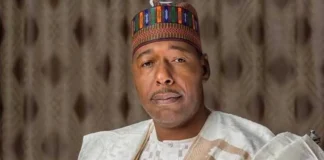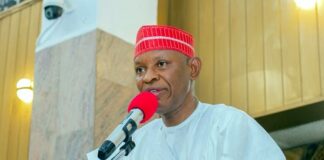The billionaires’ fight for the control of Nigeria’s oldest financial services group – FBN Holdings (FBNH) Plc – is set for a climax.
Two business moguls Oba Otudeko and Femi Otedola will today take their struggle for the control of the first generation bank to shareholders at the Annual General Meeting (AGM)
After many attempts to frustrate the holding of the AGM, the Board of FBN Holdings, yesterday succeeded in clearing all hurdles, including a previous court order, stopping the AGM as it got the green light to proceed with the meeting as scheduled.
Several shareholders and stakeholders had alleged that Otudeko was behind the attempts to frustrate the holding of the AGM, with some shareholders directly accusing the businessman of allegedly sponsoring the court order stopping the AGM.
In a regulatory filing at the Nigerian Exchange (NGX), the board of FBNH confirmed that it had succeeded in filing a notice of appeal and motion on notice for stay or suspension of execution and suspension of further hearing of the Federal High Court (FHC)’s order stopping the AGM, pending the determination of the appeal filed at the Court of Appeal.
At the AGM, all eyes will be on two major items on the agenda- the approval of Otedola as a non-executive director of the group and the proposal to undertake a N150 billion rights issue.
The group will be seeking the approval of shareholders to raise about N150 billion in new equity funds by offering new ordinary shares to existing shareholders.
Related to the above, the board is seeking a direct approval of shareholders to sell any shares not taken up during the rights issue to “interested shareholders of the company on such terms and conditions as may be determined by the directors”, subject to the approval of the regulatory authorities.
The intrigues will centre around the increase in the group’s issued share capital from N17.95 billion to N22.43 billion through the creation of additional 8.97 billion ordinary shares of 50 kobo each, the new capital raising and the election of directors.
The FBNH is seeking shareholders’ approval for the election of Otedola as a non-executive director of the group.
Otedola was appointed by the board as a non-executive director on July 9, almost the same time that a special purpose vehicle registered in the name of Otudeko’s children announced the acquisition of the single largest individual shareholding of 13.3 per cent in the group.
The ratification of the appointment of Otedola, a statutory requirement, is seen as a bulwark against alleged attempts by Otudeko to stage a comeback and take control of FBNH.
Otudeko’s long reign as a director and chairman of the group was ended by a regulatory intervention by the Central Bank of Nigeria (CBN). Several shareholders’ groups have openly endorsed the appointment of Otedola.
Also, Executive Director, Finance, FBN Holdings, Mr Samson Oyewale Ariyibi, who was appointed by the board and approved by the CBN last year would be presented for shareholders’ approval. There is no major opposition to Ariyibi’s appointment, according to sources in the know.
The adoption of virtual mode for the general meeting had come under intense criticism by groups with alleged links to Otudeko, with allegations that the board of the group settled for the virtual mode to be able to control the proceedings in favour of the resolutions.
Several other groups with open endorsement of the board’s decisions had countered that the virtual mode is a trending mode among quoted companies, in compliance with the Business Facilitation (Miscellaneous Provisions) Act.
FBN Holdings had confirmed that Barbican Capital, an affiliate of Otudeko’s Honeywell Group Limited, acquired about 4.77 billion ordinary shares in the holding group, representing 13.3 per cent of the group’s 35.9 billion issued shares.
However, Rule 4.1 of the Guidelines for Licensing and Regulation of Financial Holding Companies in Nigeria stipulates that where shares amounting to five per cent of a holding company are acquired through the secondary market, such holding company shall apply for approval from the CBN within seven days of the acquisition.
Barbican Capital, incorporated in March 2023, has Otudeko’s children – Oyeleye Foluke and Otudeko Obafemi Adedamola as main owners. CBN’s rules on “lifting of veil of beneficial owners” however allow the apex bank to trace the sources of funding for the acquisition in determining the beneficial owner of the deal.
Extant capital market rules also required formal disclosure and review of material shareholding of five per cent and above by the regulatory authorities.
The CBN has not made any statement on its decision regarding the Otudeko’s acquisition.
However, attorneys to Ecobank Nigeria have written many petitions, alleging that the Barbican Capital’s FBNH’s acquisition was an attempt to frustrate a Supreme Court judgement against Otudeko, in favour of the bank.
Sources close to Otudeko have consistently denied the claims.
In the event of regulatory approval of Otudeko’s shareholdings and its qualification for the rights issue, Otudeko’s Barbican Capital will be required to pick up its entire rights, an immediate estimated demand of about N20 billion.
Shareholders’ approval of the mandate of the board to sell rights not taken up during the offer period gives the board upper arm in the final allotment of the shares. Many analysts pointedly said the board control was the main thrust of the struggle for the AGM.
All Nigeria’s largest minority retail shareholders’ groups were in support of holding the AGM as scheduled.
Shareholders under the aegis of Association of the Rights of Nigerian Shareholders (AARNS) yesterday hailed the success of the processes to hold the AGM as scheduled as a victory for corporate governance and shareholders’ protection.
They noted that the approval to proceed with the AGM as further demonstrated that the courts and regulators will not allow people to interrupt company’s meetings “due to the selfish interest of some shareholders”.
“We will continue to appeal to major shareholders to resolve their differences in the interest of the organization, in addition to calling on the regulators to ensure they do their best to protect our investments,” AARNS stated.
National Coordinator, Independent Shareholders Association of Nigeria (ISAN), Mr. Moses Igbrude, had said resorting to court to stop the statutory AGM was bad because there were no operational issues or infringements within the company to warrant such a move.
He appealed to major shareholders to sheathe their swords and work for the unity of the bank by putting their resources and expertise in the service of the bank.
Chairman, Pragmatic Shareholders Association of Nigeria, Mrs. Bisi Bakare said the bank was more important than any individual’s interest, berating the attempt to use court to stop the AGM as a bad move.
She noted that as a major financial group, anything that happens to FBNH will affect the whole economy, creating massive distress and huge unemployment.
READ ALSO Shareholders tackle businessman Otudeko over alleged moves to stop FBN AGM
“The former director that is creating problem in FBN should not allow a small bank to acquire it,” Bakare said, referencing popular allegation against Otudeko.
Chairman, Ibadan Zone Shareholders Association (IBZA), Mr. Eric Akinduro, said going to court to stop the AGM now was not the best for the company and investors.
According to him, the investors of FBN Holdings had over the years suffered a lot and as such would not tolerate anything that will further endanger their investments.
“Looking at the company where it is today, we are not happy but we believe things are getting better particularly when you consider the second quarter result. So, the best thing is for the company to move forward. The idea of going to court should not arise now. The proposed agenda for the AGM is a good step to move the bank forward.
“If there is any misunderstanding, this could be resolved in line with good corporate governance rather than jeopardising our investments. Many of our members in the past know how much we are getting on dividend yearly from FBN, but today the bank is a shadow of itself. We are not happy when our investment value is deteriorating,” Akinduro said.
Shareholders under the auspices of Trusted Shareholders Association of Nigeria (TSAN) had alleged that Otudeko was the one behind the court order that initially stopped the AGM.
Chairman, Trusted Shareholders Association of Nigeria (TSAN), Alhaji Muktar Muktar, pleaded with Otudeko to join hands with other investors to reposition the FBNH.
Muktar, who had led minority shareholders to protest the move to stop the AGM, also advised Otudeko not to forget that First Bank contributed significantly to the growth of his business empire and should not do take actions that would destroy the wealth of many Nigerians who are investors in FBN Holdings.
According to Muktar, in his 30 years of experience in the capital market, he has not seen where someone will approach a court to stop a statutory meeting from holding.
He noted that AGM is a meeting authorised and recognised by the laws of the Nigeria and the courts had in several instances recognized such meeting as statutory, thus disallowing previous attempts to stop AGMs.
He alleged that Otudeko was the one behind the court move to stop the AGM.
“We are very sure that it is Oba Otudeko. He is the one that is behind this move to stop the AGM. Someone who has benefitted immensely from this bank. Otudeko’s business activities enjoyed significant funding from First Bank of Nigeria.
“He was a director and rose to the position of a chairman in the past. Only recently he bought into the bank and he is probably afraid that if the resolution to raise fresh capital is passed at the AGM, his holdings would be diluted. This is very bad.
“An institution that has built his business empire should not be treated this way. He is having these fears due to the coming of certain investors who have boosted confidence in the bank.
“These fears are unfounded. I don’t see any reason why any individual should be afraid of resolutions that will enhance the performance of the bank by bringing more money to the bank. As you know, the fabric of banking business is capital. Any bank that does not have enough capital to give out loans, finance businesses will not do well in the face of the strong competition,” Muktar said.
SOURCE
The Nation Newspaper















